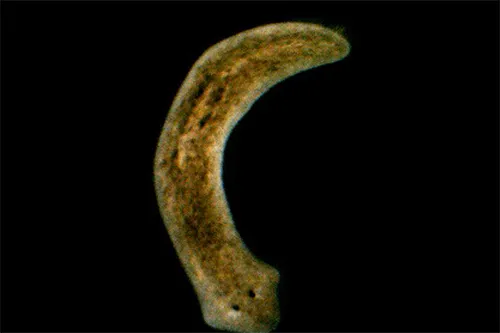Eva-Maria Collins Receives NIH Grant, Advancing Ethical Toxicology Research

At first glance, flatworms seem quite unlike humans, but Associate Professor of Biology and Adjunct Associate Professor of Physics & Astronomy Eva-Maria Collins is uncovering valuable insights into human health by studying these invertebrates.
Collins received a $391,640 grant from the National Institutes of Health/National Institute of Environmental Health Sciences (NIH/NIEHS) to advance her research using planarians, or flatworms, to study the toxicity of organophosphorus pesticides, a class of insecticides that are widely used in agriculture. Collins says students can look forward to this research as it has a direct connection to their everyday lives, including their food, environment, and health.
Chronic exposure to this class of pesticides has been associated with developmental neurotoxicity and long-term neurological problems in humans. However, a solution is not so simple as eradicating the use of pesticides.
“Pesticides play an important role in our lives, to control pests in agriculture and parks,” Collins explains, “but it is important to understand how they affect organisms, including humans, and to determine what levels of exposure are okay and when exposure becomes harmful, so we can take measures to protect us and the environment.”
The Collins Lab uses planarians to understand the effects pesticides have on brain development and to unravel the mechanisms by which they cause adverse effects. To understand the relevance of effects in planarians for human health, it is important to determine whether the way flatworms bioactivate and detoxify the pesticides is similar to humans. Published studies from the Collins lab showed that these invertebrates can process these pesticides like humans; this new NIH project will allow the Collins Lab to identify the enzymes responsible for the activity and to compare them to the human enzymes.

Planarian/flatworm photographed by Hannah Poon '27.
“I am excited for the unique toxicology research opportunities this project provides for our students,” says Collins, “who will be able to explore these fascinating questions with me and the excellent senior scientists in my group.”
Planarians have many features (low-cost, aquatic, amenable to rapid screening) that make them an attractive organismal model for neurotoxicity studies. As an invertebrate, this research model is considered a New Approach Method that serves as a more humane, cost-effective alternative to testing pesticides on mammals like rats and mice. The project aligns with the “three R’s” of ethical research: replacement, the substitution of vertebrates with invertebrates and non-animal alternatives; reduction, decreasing the number of animals used to obtain information of given amount and precision; and refinement, an improvement of the procedures applied to animals which still have to be used.
This research complements Collins’ ongoing NIH Chemical Countermeasures Research Program (CCRP) award and a grant from the NIEHS. Her CCRP project is focused on developing a cost-effective platform for screening possible treatments for acute pesticide toxicity. The NIEHS grant supports studies on how organophosphorus pesticides affect the developing brain.



